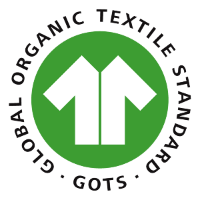Look On The Label : Clothing Certifications Explained
Sustainable & Eco-Friendly Certifications for Clothing
The phrases “green” and “eco-friendly” do little to uncover the extent of a clothing brand's environmental efforts. Though they imply ethical and sustainable practices, greenwashing tactics often use these buzzwords because of their vague nature. As the sustainable fashion industry grows, the need for transparency is more important than ever. Where the typical terms fall short on specifics, clothing certifications supply shoppers with the reassurance they need to invest in the right products. These voluntary certifications can represent any and all aspects of the manufacturing process, and help shoppers determine which standards and criteria brands are meeting. Whether searching for verified organic materials or confirmation of ethical working conditions, these certifications extend to nearly every part of our concerns as conscious shoppers. Now it’s time to understand what these labels actually mean, and where we can find them!
1) Global Organic Textile Standard (GOTS)
What is GOTS-Certified?
GOTS is recognized worldwide as the leading textile process standard for organic fibers, verifying that the supply chain meets its criteria for the coveted “Made With Organic” stamp. With a clear set of environmental and ethical requirements, this certification identifies brands committed to sourcing organic materials. GOTS-certified products ensure that all textiles are made from at least 70% organic natural fibers and that any chemical input (such as dyes) is evaluated for toxicity and biodegradability. Social criteria must also be met by upholding the labor standards set forth by the International Labor Organization.
Where Can You Find GOTS-Certified?
Brook There proudly promotes that their everyday undergarments are made from GOTS-certified organic cotton. This minimalist lingerie brand designs for longevity by pairing durable material with timeless styles and colors.
Komodo, self-proclaimed as “The Original Ethical Brand Since 1988,” declares that looking good while protecting the environment goes hand-in-hand. These sleek silhouettes with pops of color for both men and women are GOTS certified and a member of the soil association.
2) Fair Trade Certified
What is Fair Trade Certified?
A Fair Trade Certified seal confirms that a brand pays fair wages to workers in developing countries and ensures that all employees work in safe conditions. In addition, brands with this certification emphasize garment laborers' rights in their supply chain and environmental protection. Fair Trade prioritizes the treatment of people to build sustainable livelihoods and uplift communities through an internationally agreed set of social, economic, and ecological standards. There are a few types of Fair Trade certifications, each with personalized distinctions.
Once the same entity, Fair Trade USA and Fair Trade International separated to allow Fair Trade USA to grant certifications to large and small farms. While their labor standards are nearly identical, Fair Trade International also includes an environmental standard prohibiting GMOs and toxic chemicals. As a result, shoppers can be sure that a Fair Trade certified product uses methods of production that protect not only the environment but also the people who made them.
Fair Trade Federation (FTF) and World Fair Trade Organization (WTFO) differ from Fair Trade USA and International because they are granted to a company or enterprise instead of a product or material. FTF, which relies upon self-reporting, is a network that grants companies membership based on ethical standards like safe working conditions, living wages, and environmental stewardship. WTFO is a community of enterprises dedicated to fair trade and demonstrating their commitment to serving marginalized communities and solutions to broad issues such as the overuse of natural resources, women's empowerment, refugee livelihoods, human rights, inequality, and sustainable farming. Through peer reviews and independent audits, WFTO verifies members are mission-led and implementing the 10 Principles of Fair Trade across their business and supply chains.
Where Can You Find Fair Trade Certified?
Kowtow is a women’s workwear brand you can feel proud to keep in rotation. Based in New Zealand, their boldness extends past picking patterns and into their commitment to the environment. With 100% Fair Trade certified cotton, Kowtow embodies what it means to be mindful of the communities where they work.
Outerknown is certified by Fair Trade USA and is also dedicated to working with recycled material to combat the issues of textile waste. For the adventurous type, Outerknown makes clothes for those who get out into nature just as much as they talk about it.
3) Standard 100 by OEKO-TEX
What is OEKO-TEX Standard 100?
OEKO-TEX is a popular label with several certifications on chemical usage in garments. Standard 100 is the most common certification testing for substances that are harmful to humans. If an article of clothing carries this certification, it’s a guarantee that every component has been tested for toxic chemicals and given a clean bill of health. The test is conducted based on an extensive criteria catalog, updated at least once a year to expand with new knowledge and requirements. As a result, OEKO-TEX experts have consumers’ backs when protecting their health from potentially harmful chemicals in their clothing. An apple a day keeps the doctor away, but OEKO-TEX keeps the chemicals away.
Where Can You Find OEKO-TEX Standard 100?
Outland Denim was founded as a training and employment opportunity for women who have experienced sex trafficking. Today, these women craft premium denim from the finest OEKO-TEX Certified materials worldwide.
Read more about OEKO-TEX Certified Here & Find a List of 14 Brands who use the Certification
4) Certified B Corporations
What are Certified B Corporations?
B Corp certifications measure the full scope of a company’s social and environmental performance. This includes anything from materials to supply chain and employee treatment. The non-profit B Lab awards its stamp of approval and takes into consideration a brand’s approach to people, products, and profit. B Corp Certified businesses are expected to meet their rigorous social and environmental standards, focusing on transparency and accountability. This certification is about establishing a brand as a force for good and as leaders in the larger global movement for better practices. These companies balance profit with an emphasis on purpose.
Where Can You Find Certified B Corps?
KOTN fulfills its responsibilities as a B Corp by directly working to benefit the lives of its cotton farmers. Their mission is to set the standard for conscious creation and consumption with underwear and loungewear for men and women.
5) Cradle to Cradle (C2C)
What is Cradle to Cradle Certification?
C2C Certified products focus on circularity. To receive certification, products are assessed for environmental and social performance across five critical sustainability categories: material health, material reuse, water stewardship, social fairness, and renewable energy and carbon management. A product is assigned an achievement level (Basic, Bronze, Silver, Gold, Platinum) for each category. In addition, cradle to Cradle works to identify brands that not only have ethical materials sourcing on the front end but also consider the end-of-life impact of their product.
Where Can You Find Cradle to Cradle Certification?
Eileen Fisher is a C2C Certified brand committed to making circularity the new standard for the sustainable fashion industry. For over a decade, they have collected gently worn EF garments to clean and resell, finding innovative ways to keep clothes out of landfill.
Loomstate is a sustainable brand based in New York City that has also reached C2C Certified status. Through its unique sourcing and design, Loomstate is changing how we see professional uniforms in sustainable fashion. As if that wasn’t enough, they are also Fair Trade and OEKO-TEX certified.
6) Leather Working Group (LWG)
What is LWG Certified?
The LWG certifies tanneries and leather traders based on their adherence to environmental protection guidelines. LWG ratings (Gold, Silver, or Bronze) are based on how companies' production processes affect the environment. Audits are done by several third parties using the same standards, considering waste management, energy consumption, and water usage. This certification aims to reward brands sourcing leather from environmentally responsible suppliers.
Where Can You Find LWG Certified?
Nisolo is not only a certified B Corp; most of their leather comes from LWG Certified tanners in León, Mexico. This 100% carbon-neutral footwear brand pushes the industry toward a more sustainable and ethical direction.
Everlane has established itself by designing comfortable basics with what they call "radical transparency" in its manufacturing processes. In addition, Everlane continues its commitment to sustainable staple items with a Gold certification from the LWG.
Although better than conventional leather, LWG has its criticisms. Read them here.
7) Forest Stewardship Council (FSC)
What is FSC Certified?
The Forest Stewardship Council (FSC) is a non-profit organization with standards to ensure forestry is practiced in an environmentally responsible and socially beneficial way. An FSC certification is considered the "gold standard" designation for wood harvested from forests. Though we usually think of wood usage in terms of furniture, construction material, and paper, it's also expanding into the textile world. Forest-based fabrics, such as rayon, Tencel, viscose, modal, or lyocell, are becoming increasingly more popular in the fashion industry and can be more environmentally friendly than synthetic textiles or cotton if the cellulose fibers come from well-managed forests. There are three types of labels that the FSC distributes: FSC 100 Percent for products from FSC-certified forests, FSC Recycled for products made from reclaimed material, and FSC Mixed for when a product is made from at least 70 percent FSC-certified or recycled materials.
Where Can You Find FSC Certified?
Sézane is a French ready-to-wear brand that has been bestowed an FSC certification for its commitment to a more sustainable world. Their collection includes a detailed breakdown of each component showcasing 68% FSC-certified mixed viscose. These pieces may be vintage-inspired, but they are made from sustainable fashion's most innovative materials.
Nau is an outerwear and loungewear brand that has earned its sustainable stripes by producing durable products made from certified natural materials. Their breathable, moisture-wicking activewear consists of FSC-certified eucalyptus Tencel and promises to be your favorite pick for warm weather days.
A Few More Certifications…
Better Cotton Initiative: A non-profit organization that supports a more sustainable way to source cotton through a defined set of standards. For example, Kathmandu
& One Last Note…
PETA labels are not typically considered a sustainable certification since they don’t consider workers’ rights or environmental impact. However, their standards for animal treatment and plant-based products are still worth noting since they’re seen so frequently. In addition, both of these labels are based on self-reporting without using a third-party auditor to verify.
Approved-Vegan: This label signifies that the brand or product has signed PETA’s statement of assurance verifying that their product is vegan.
Cruelty-Free: This bunny logo is most commonly used for personal care and beauty products to signify that the company did not conduct or commission any animal tests during product research.
Julia Grinberg is a writer based in Philadelphia, PA. She is a blog contributor for the vegan shoe brand Sylven New York, and the upcycled leather accessories brand Hyer Goods. When she is not writing on the topic of sustainable fashion, she is crafting short stories for various outlets and is currently working on a collection of creative nonfiction essays.















